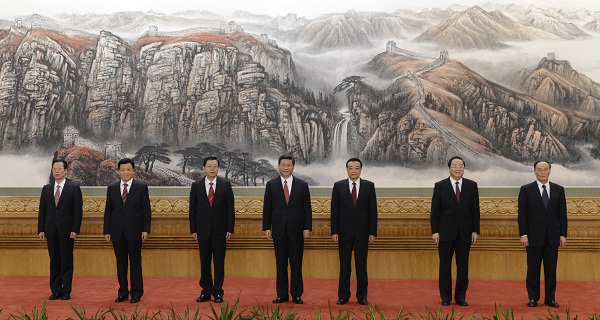China unveils new leaders with Xi Jinping at helm

General Secretary of the Central Committee of the Communist Party of China (CPC) Xi Jinping (C) and the other newly-elected members of the Standing Committee of the 18th CPC Central Committee Political Bureau Li Keqiang (3rd R), Zhang Dejiang (3rd L), Yu Zhengsheng (2nd R), Liu Yunshan (2nd L), Wang Qishan (1st R), Zhang Gaoli (1st L) meet with journalists at the Great Hall of the People in Beijing, capital of China, November 15, 2012. (Xinhua/Xie Huanchi)(ry)
BEIJING — China unveiled its new leaders Thursday, with Vice President Xi Jinping marching on stage at the head of a revamped line-up that will steer the world’s number two economy for the next decade.
Xi succeeds President Hu Jintao as head of the ruling Communist Party, assuming power at an uncertain time with urgent calls for action on corruption and an overhaul of China’s economic model as growth stutters.
His long-expected ascension to the apex of national politics was confirmed when he emerged onto the stage at the Great Hall of the People ahead of the six other members of the elite Politburo Standing Committee.
Standing in front of his colleagues, Xi said the new leadership faced “enormous responsibility” but would fight for a “better life” for all China’s 1.3 billion people.
Xi, a 59-year-old who as the son of a revolutionary hero has an impeccable political pedigree, will formally replace Hu as president when the rubber-stamp legislature confirms the appointment in March.
Article continues after this advertisementBut Xi’s unqualified standing atop China’s power structure was emphasised on Thursday with Hu also handing him control of the Central Military Commission.
Article continues after this advertisementHu’s predecessor Jiang Zemin had clung on to that job, which steers the world’s largest military, for two years after relinquishing the national presidency.
In second place in the new elite line-up — which was slimmed from nine members to seven — was current Vice Premier Li Keqiang, whose promotion sets him up to be appointed the country’s premier next year.
The leadership team, all new additions except for Xi and Li, walked onto the stage at the cavernous hall, waving and smiling.
The spectacle marked the culmination of years of jockeying within the secretive party which has a monopoly on political power in China.
The process was essentially finalized Wednesday when the party ended a week-long congress by announcing a new 200-strong Central Committee. On Thursday it approved higher leadership bodies including the Politburo Standing Committee.
The elite group is tasked with addressing a rare deceleration of economic growth that threatens the party’s key claim to legitimacy — continually improving the livelihoods of the country’s people.
China also bubbles with localised unrest often sparked by public rage at corruption, government abuses, and the myriad manifestations of anger among the millions left out of the country’s economic boom.
China’s economy, which relies heavily on manufactured exports, has been stunningly successful in lifting hundreds of millions out of poverty.
But the party acknowledges the model is becoming unsustainable as the economy matures and demands for higher living standards grow, and Hu last week called for a new approach with a robust private sector and stronger domestic demand.
How the new leadership under Xi will address these challenges remains unclear.
Observers believe that two main factions have been jockeying for power, one centred largely on proteges of Jiang — who has made a surprise political comeback — and another linked to allies of Hu.
Xi is considered a consensus figure who leans toward Jiang, while Li has long been seen as a Hu protege.
But otherwise little is known about Xi, his policy preferences, or how he would govern — not unusual in a top leadership that closely shields the private lives and views of its members.
Analysts say that despite rivalries between the two camps, which are largely divided on patronage lines, they broadly agree China must realign its economy away from a dependence on exports, while maintaining a firm hand on dissent.
And they note that major policy changes are unlikely in the short term, as Xi concentrates on consolidating his position.
Beijing has ramped up security in Beijing and on the nation’s popular social media sites to prevent any criticism during the gathering.
The run-up to this year’s congress was unsettled by events surrounding Bo Xilai, a political star seen as a candidate for a top post until a scandal in which his wife was convicted of murdering a British businessman.
The sensational affair torpedoed Bo’s political career — he will face trial for charges of corruption and abuse of power — and added to the intrigue in the run-up to the transition.